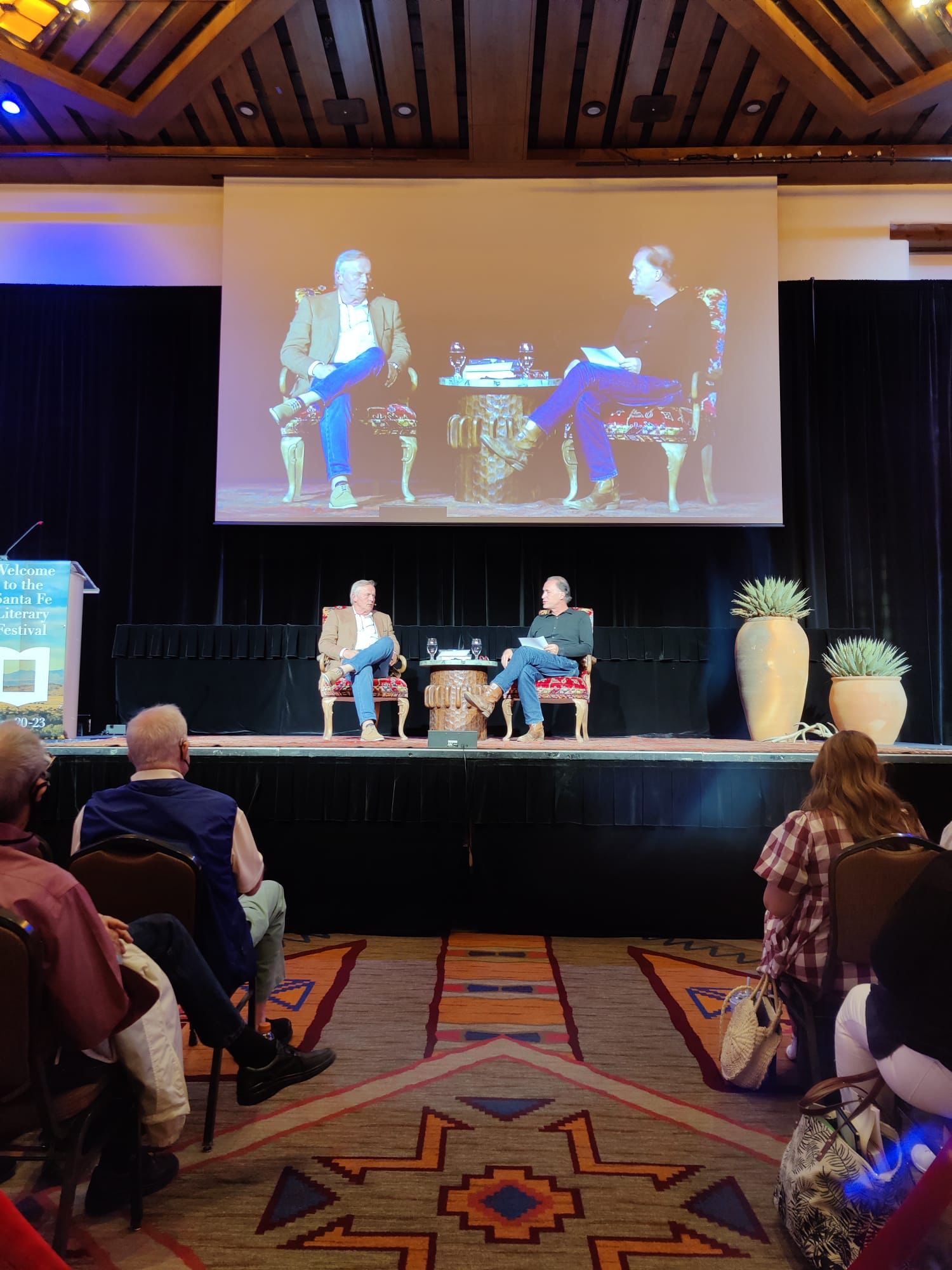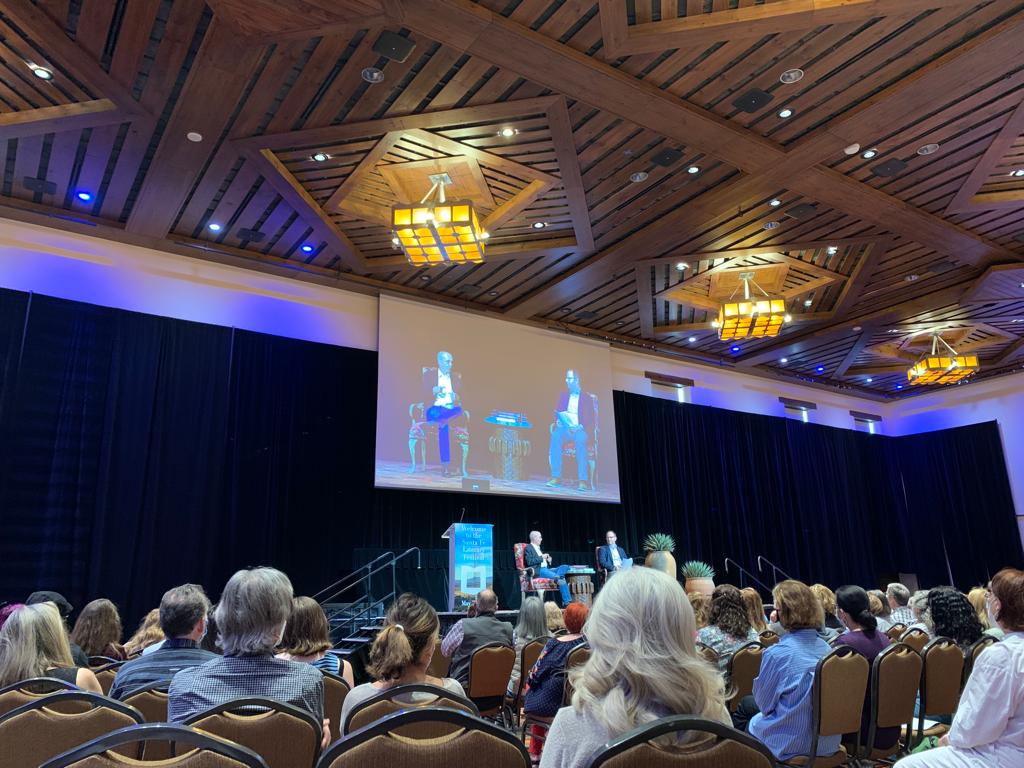
John Grisham doesn’t usually like to read aloud from his books. “Frankly, usually when I’m finished with them, I’m sick of them,” he says, during a talk onstage at Santa Fe Literary Festival. “I’ve never been able to go back and read my stuff.” Then he adds, jokingly, “Until tonight.”
Like all authors speaking at the festival in New Mexico, Grisham has agreed to read a short excerpt from his latest book before answering questions. No doubt he has actually done so before — but his aside about how much he hates returning to his own writing is relatable to creatives across the spectrum. Johnny Depp famously claims to have never watched a single one of his own movies. Meryl Streep says she can bear to see films she’s starred in only once. And John Green, the celebrated author of The Fault in Our Stars, has also said that although he appreciates the dedication of fans, he’s also “sick of” his own books by the time they hit the shelves.
An actor might tire of their own work long before it appears on the silver screen because of shooting and re-shooting scenes a tedious number of times. For writers, that process is repeated in editing. “Every sentence in this book [Under the Banner of Heaven] has been rewritten a hundred times,” says John Krakauer during another talk at the event in Santa Fe. When the audience laughs, he says, “No, really,” adding, “Writing is really hard for me. I’m not being facetious; I’m not a natural writer. Every sentence in this book has been rewritten a hundred times.”
Grisham had trouble with something a little more specific: sex scenes. While his mother was still alive, he says, he had a policy of only writing books she could read — and who wants their mother to read their own perspective on sexual relations? “She passed away a few years ago so I tried to write a sex scene for the first time,” he says.

There is a sense that the methods of famous, internationally successful authors must be both rigorous and mysterious, and that we might all have a shot at writing bestsellers if we found out about the secret sauce. A lot of the time, however, it seems to boil down to that famous quote about how to have a long marriage: just don’t get divorced. Likewise, the most successful writers just keep writing, even when it’s inconvenient, even when it doesn’t sell, and even when it’s barely enjoyable at all. “Every day I begin with crippling writers’ block,” says Krakauer. “Many days, when I’m writing a book, I don’t write anything until 3pm even though I started at 6am.” What sets him apart may simply be that he continues to try until 3pm when others might have walked away from their computer screen at noon.
George R R Martin — the hugely successful fantasy author and screenwriter whose best-known work, A Song of Ice and Fire, was adapted into the HBO series Game of Thrones — has some plain-spoken advice for anyone thinking about becoming a writer: “Examine your personality traits. Do you value security? Find another profession.” He began writing science fiction in the 1970s, where he sold modest amounts of books and supported himself mainly through teaching. In 1983, he wrote an ambitious cross-genre novel called The Armageddon Rag that his agent “promised would be a big bestseller” — and that was almost immediately optioned for a movie — so he bought a house and his first ever new car, and prepared for fame and fortune. “There was only one problem with my big bestseller,” Martin says, with a laugh. “It didn’t sell.” In fact, The Armageddon Rag was a commercial disaster. The book, which was part rock-and-roll themed mystery and part science fiction, “didn’t fit anywhere”. Once a darling of publishers and reviewers, Martin was suddenly dropped like a hot potato: “I saw the dark side of the publishing world. No one was interested in me any more.” He almost ended his writing career entirely, taking years out to work on TV projects instead. But then, of course, he started writing novels again — and we all know what happened after that.
Don Winslow — author of numerous bestselling crime novels, including The Power of the Dog — had a similar moment to Martin. Though The Power of the Dog — an ambitious novel that spans three decades of the War on Drugs — was a commercial and critical success, he says it “took me six years to write and almost ruined my career”. Publishers expect writers to produce something new regularly, he says, and he spent three full years only doing research, which was a problem of such magnitude that it could have lost him his agent and all publishers interested in his work.

Winslow says days when he says to himself, “Oh my God, I’m never writing again, I may as well jump off a bridge,” are a familiar part of the writing process. His main tip, he says, is “write fast or you write slow”: that is, get through the narrative as quickly as possible and don’t worry about fine-tuning until you have the whole plot down on the page. “In the first few drafts, I write like I’m gonna get caught,” he says. “Then, on draft ten or so, I sit back from the screen so I can see just the shape of the page — not the individual words — and think: Does it look right?... An action scene should be very black to look at, very dense. Or a scene where I want the reader to focus in on one or two words should have a lot of negative space.” After that edit, he says, he does another edit that focuses on verbs, then nouns, making sure that the right sound is matched with the mood of the scene: “If it’s a love scene, I want soft consonants and vowels. But if it’s action, I want lots of plosives.”
Two-time Pulitzer Prize winner Colson Whitehead modestly attributes the continued success of his work to time: “You do a job for 20 years, you tend to get better about it” (though, after a beat, he adds it’s also possible that “you plateau and then you start sucking”.) When asked about how he came up with the idea for Underground Railroad, he says, “Well, I was lying on my couch, depressed. I’m often taking depressive naps.” It’s highly likely Whitehead is being tongue-in-cheek, however, considering George R R Martin’s description of “Where do you get your ideas?” as “the one question all writers hate”. Martin says that he has a friend who got so tired of being asked it that he began replying: “Schenectady,” and then spread a rumour that he has a cabal of ideas-generators in the town of Schenectady who send him plots on demand.
Whitehead clearly spent a lot of time researching his work — one doesn’t get a Pulitzer Prize for throwing a stream of consciousness on the page after a nap — but it’s not just intricate historical details that he focuses on. One of his characters is a furniture salesman, and he cut out of a furniture store advertisement from a magazine at the start of his research so he could mimic the wording and learn the relevant terms (the same character has a penchant for expensive foreign rugs because, Whitehead jokes, “I learned about foreign rugs being good for money during the Manafort trial.”) He injects little parts of himself into characters to make them authentic, such as one character’s obsession with keeping his socks private, and when he first started doing readings at literary festivals, he tempered his nerves by choosing an excerpt that took him back to a “moment of composition” he particularly enjoyed. But that doesn’t mean he looks at his work — even those scenes from joyful moments of composition — without a critical eye. During his reading on Friday evening in Santa Fe, he stops at one character’s line and says, “That’s not a great line, I’m going to fix that.” When a member of the audience asks later what was wrong with the line in question, he says that when he read it out loud it sounded a bit “B-movie villain”.

When asked if, like Whitehead, she gets any ideas from depressive naps, two-time Booker Prize winner and author of The Handmaid’s Tale Margaret Atwood says, “I’m not much of a napper, but I understand procrastination very well. [Writing a novel] is about the homework, about dragging yourself into a corner until you just have to do it.” She enjoys writing, she adds, but “it is very like going swimming in Canada” — you put your toe in, you take it out, you put a toe in again and rethink whether you’re really going to take the plunge — then eventually you realise “the only way you’re gonna get in there is to run screaming.” Even after all her success, “it’s always the same risk” when she sits down to start a new book, she says: “The water doesn’t get any warmer.”
Once Atwood is in flow, however, she can write for eight hours a day or more and even make herself ill because she’s sat all day at her desk. “People around you remind you it’s time to eat something now,” she says, with a laugh, “and that’s useful.” Atwood is one of the world’s most prolific writers, but she’s keen to remind the audience that she comes from humble origins: “My first professional book-signing ever was in the men’s sock and underwear department of the Hudson’s Bay Company in Edmonton,” she says. “The book was The Edible Woman. I think I just frightened a lot of men.”
Emily St John Mandel — author of the prophetic-feeling 2014 pandemic novel Station Eleven as well as one of Barack Obama’s favourite books of 2020, The Glass Hotel — says she wrote her latest book, Sea of Tranquility, during the worst days of the Covid pandemic. “I lived in Brooklyn, about a mile from the hospital,” she says, describing how ambulances would fly past her apartment every second of every day and light up her windows through the night. “There was the atmosphere of death.” She wanted to write during that time because “there’s something about writing a novel, where you construct a world that is wholly under your control. And it was a time when we had no control.” The setting was the Moon, because she wanted to imagine herself as far away as possible from the dire situation unfolding outside her door in New York.
Mandel adds that she “didn’t really see Station Eleven as a pandemic book,” adding, “I know that sounds crazy, but stay with me.” Instead, she wanted to write about a “post-technological society” and “to get to a post-technological society, you have to end the world.” She wanted to work within the confines of a setting where there was a clear struggle. Similarly, Winslow doesn’t pick top mobsters to write about but rather characters in the middle, taking hard knocks, because “it’s far more interesting to me to write about someone who’s a little bit on the outside. If you’re writing about someone at the top, the only way they can go is down.” Indeed, having room to move narratively is probably the most important thing to bear in mind when writing, almost every author at the festival agrees. “People say: You write these dystopias. Can’t you give us something a little more hopeful? Can you write us a utopia?” says Atwood. “Well, as a literary form, a utopia is too hard to write. Because if everything’s perfect, it’s boring.”
The Independent, as the event’s international media partner, has provided coverage across each day of the festival with exclusive interviews with some of the headline authors. For more on the festival visit our Santa Fe Literary Festival section or visit the festival’s website.







